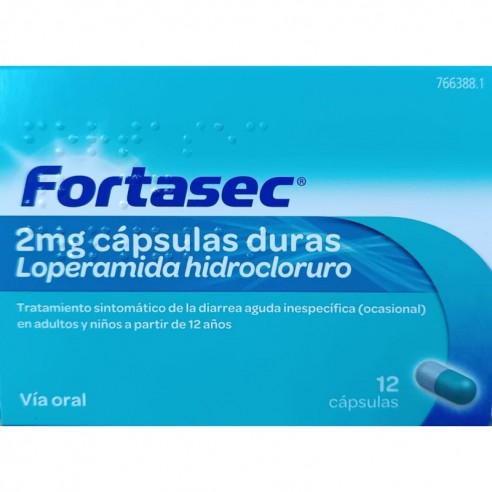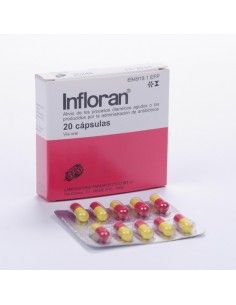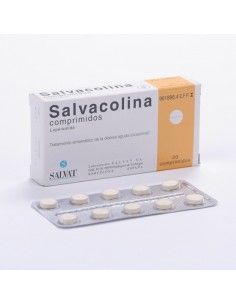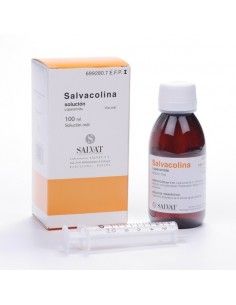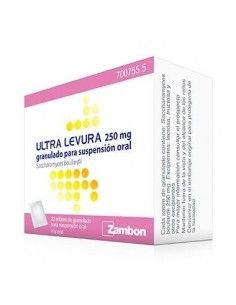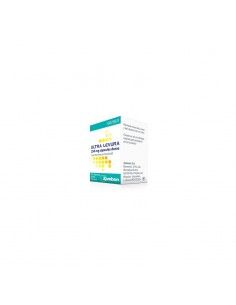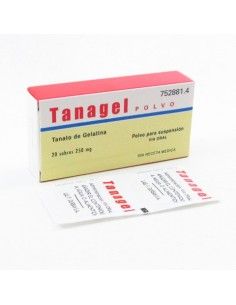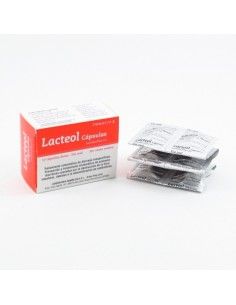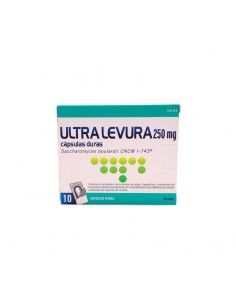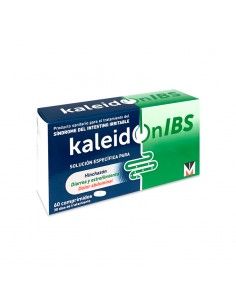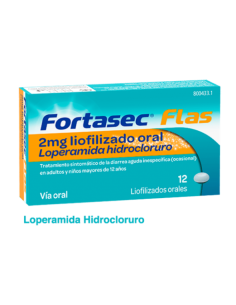Fortasec 2 Mg 12 Capsules
What is FORTASEC 2 mg hard capsules and what is it used for? It is an anti-diarrhoeal medication that reduces intestinal movements and secretions, which produces a decrease in liquid stools .
It is indicated for the symptomatic treatment of acute non-specific (occasional) diarrhoea in adults and children over 12 years of age.
You should consult a doctor if it worsens or if it does not improve after 2 days.
2. What you need to know before you start taking FORTASEC 2 mg Hard Capsules
Do not take FORTASEC 2 mg Hard Capsules
- Children under 12 years of age
- If you are allergic (hypersensitive) to loperamide hydrochloride or any of the other ingredients of this medicine (listed in section 6)
- If you have a high fever (over 38ºC) or blood in your stools.
- If you suffer from ulcerative colitis (inflammation of the intestine)
- If you suffer from severe diarrhoea after having taken antibiotics.
- If you suffer from diarrhoea due to an infection caused by organisms such as Salmonella, Shigella and Campylobacter
- Treatment should be stopped quickly and your doctor consulted if constipation, abdominal distension (bloating) or ileus (absence of bowel movements) occur.
Warnings and precautions
- Consult your doctor or pharmacist before starting to take FORTASEC 2 mg Hard Capsules
- If you suffer from severe diarrhoea your body loses more fluids, sugars and salts than normal, you will need to replace the fluids by drinking more than usual. Ask your pharmacist about preparations to replace sugars and salts
- Treatment with this medicine is only symptomatic, so diarrhoea should be treated according to its cause.
- If you have AIDS and your stomach becomes bloated, stop taking this medicine immediately and consult your doctor.
- If you have liver disease, consult your doctor before taking this medicine, as toxicity to the central nervous system may occur.
- If you are taking any narcotic painkillers, you should consult your doctor or pharmacist before taking this medicine, as it may interact with them.
Do not take this medicine for any purpose other than that indicated (see section 1) and never take more than the recommended amount (see section 3). Serious heart problems (symptoms include a fast or irregular heartbeat) have been reported in patients who have taken an excessive amount of loperamide.
If there is no improvement within 48 hours or fever, constipation or other symptoms appear, stop treatment and consult your doctor.
Patients with diarrhoea should drink plenty of fluids to avoid dehydration, which is manifested by a dry mouth, excessive thirst, decreased urine output, wrinkled skin, dizziness and lightheadedness. This is especially important in children and the elderly.
Children and adolescents
Do not use in children and adolescents under 12 years of age.
Taking FORTASEC 2 mg Hard Capsules with other medicines
Tell your doctor or pharmacist if you are using, have recently used or might use any other medicines.
- It is considered especially important if you are taking medicines containing
- Ritonavir, saquinavir (used to treat HIV).
- Quinidine (used to treat abnormal heart rhythms).
- Oral desmopressin (used to treat central diabetes insipidus and nocturnal urinary incontinence in children).
- Itraconazole or ketoconazole (used to treat fungal infections).
- Gemfibrozil (used to lower cholesterol).
- St John's Wort (used to improve mood).
- Valerian (used to treat mild anxiety).
- Opioid analgesics (used to treat very severe pain) can already increase the risk of severe constipation and central nervous system depression (e.g. drowsiness or decreased consciousness).
- Broad-spectrum antibiotics, as FORTASEC can worsen or prolong diarrhoea caused by antibiotics, and increase blood levels of loperamide.
Pregnancy and lactation
If you are pregnant or breastfeeding, think you may be pregnant or are planning to have a baby, ask your doctor or pharmacist for advice before taking this medicine.
Pregnant women should not take this medicine unless prescribed by a doctor because there is no experience of its use in pregnant women.
Do not take FORTASEC 2 mg Hard Capsules if you are breast-feeding. Small amounts of the medicine may pass into breast milk.
Driving and using machines
You can drive and use tools and machines unless you feel tired, dizzy or sleepy. Do not drive or use machines on these occasions.
FORTASEC 2 mg Hard Capsules contain lactose
If your doctor has told you that you have an intolerance to some sugars, contact your doctor before taking this medicine.
3. How to take FORTASEC 2 mg Hard Capsules Follow the instructions for use of the medicine exactly, either those contained in this leaflet or those given to you by your doctor or pharmacist. If in doubt, ask your doctor or pharmacist.
The recommended dose is:
Adults
2 capsules (4 mg) as an initial dose followed by 1 capsule (2 mg) after each diarrhoeal episode.
The maximum dose for adults is 8 capsules (16 mg) a day.
Children over 12 years
1 capsule (2 mg) as an initial dose followed by 1 capsule (2 mg) after each diarrhoeal episode.
In children, the maximum daily dose should be related to body weight:
Child's weight
Maximum number of capsules per day
From 27 kg
Maximum 4 capsules
From 34 kg
Maximum 5 capsules
From 40 kg
Maximum 6 capsules
From 47 kg
Maximum 7 capsules
Take the capsules with a full glass of water.
Patients with liver disease: They should consult their doctor.
Elderly and patients with kidney disease
Follow the same instructions as described for adults and children over 12 years of age
Use in children and adolescents
Children under 12 years of age should not take this medicine. It is contraindicated.
If you take more FORTASEC 2 mg Hard Capsules than you should
Taking too many capsules can cause abnormal coordination, stupor, pupil contraction, increased muscle tension, difficulty breathing (children are more sensitive to these effects than adults) and reduced urine output.
In case of overdose or accidental ingestion, consult your doctor or pharmacist, or call the Toxicology Information Service on 91 562 04 20 (indicating the medicine and the amount ingested).
If you forget to take FORTASEC
Do not take a double dose to make up for a forgotten dose.
If you have any further questions on the use of this medicine, ask your doctor or pharmacist.
4. Possible side effects
Like all medicines, FORTASEC can cause side effects, although not everybody gets them.
Frequency not known (cannot be estimated from the available data)
Upper abdominal pain, abdominal pain radiating to the back, tenderness in the abdomen, fever, rapid pulse, nausea, vomiting, which may be symptoms of inflammation of the pancreas (acute pancreatitis).
If you experience any of these symptoms, stop using the medicine and get medical help immediately.
Very rare adverse reactions (may affect up to 1 in 10,000 people):
- Swelling of the face, lips, tongue or throat which may cause difficulty in swallowing or breathing (angioedema)
- Allergic reactions (including anaphylactic shock)
- Tiredness
- Decreased urine output
- loss or decrease in consciousness.
- abnormal coordination
- high muscle tension (hypertonia)
- stupor
- pupil contraction (miosis)
- loss of intestinal mobility (ileus including paralytic ileus)
- itching or hives
- Drowsiness
- Abnormal dilation of the colon (megacolon)
- Bullous eruption (including Stevens-Johnson syndrome, toxic epidermal necrolysis and erythema multiforme)
Reporting of adverse reactions
If you get any side effects, talk to your doctor or pharmacist. This includes any possible side effects not listed in this leaflet. You can also report side effects directly via the Spanish Pharmacovigilance System for Medicines for Human Use: www.notificaRAM.es. By reporting side effects you can help provide more information on the safety of this medicine.
5. Storage of FORTASEC 2 mg Hard Capsules Keep out of sight and reach of children.
This medicine does not require any special storage conditions.
Do not use this medicine after the expiry date which is stated on the box after ‘Expiry date’. The expiry date refers to the last day of that month.
Medicines should not be disposed of via wastewater or household waste. Please dispose of your empty packings and any medicines you may have left over by taking them to your local pharmacy. If in doubt, please ask your pharmacist how to dispose of packings and any medicines you may have left over. By doing so, you will help protect the environment.
6. Contents of the pack and additional information
Composition of FORTASEC 2 mg Hard capsules
The active ingredient is: loperamide hydrochloride (2 mg per capsule)
The other ingredients (excipients) are: Lactose, talc, magnesium stearate and corn starch. Gelatine, yellow iron oxide (E172), titanium dioxide (E171), indigotine (E132), erythrosine (E127) and black iron oxide (E172).
Appearance of product and contents of pack
They are hard gelatine capsules, dark grey and green in colour.
They come in packs of 12 and 20 capsules.

